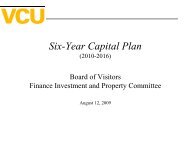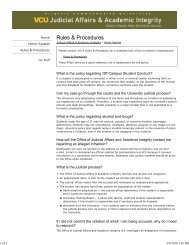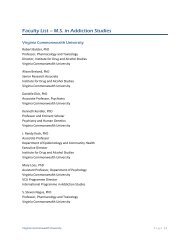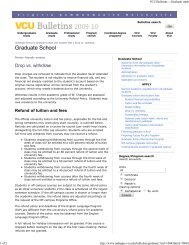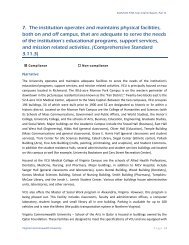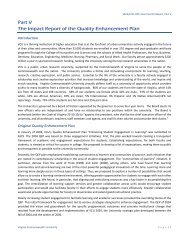4. The institution identifies expected outcomes, assesses the extent ...
4. The institution identifies expected outcomes, assesses the extent ...
4. The institution identifies expected outcomes, assesses the extent ...
You also want an ePaper? Increase the reach of your titles
YUMPU automatically turns print PDFs into web optimized ePapers that Google loves.
SACS/COC Fifth-Year Interim Report, Part III.<br />
as develop a clinical handbook. <strong>The</strong> Department also made substantive changes to items on <strong>the</strong><br />
Clinical Evaluation Continuum evaluations.<br />
School of Engineering<br />
<strong>The</strong> School of Engineering has 13 degree programs. Five undergraduate programs met accreditation<br />
standards for assessment of student learning established by <strong>the</strong> Accreditation Board for Engineering and<br />
Technology (ABET) Engineering Accreditation Commission (Criteria 2, 3, and 4) at <strong>the</strong>ir most recent<br />
reviews: Biomedical Engineering, B.S.; Chemical and Life Science Engineering, B.S.; Computer<br />
Engineering, B.S.; Electrical Engineering, B.S.; and Mechanical Engineering, B.S. In addition, <strong>the</strong><br />
Computer Science, B.S. program met <strong>the</strong> accreditation standards for assessment of student learning<br />
established by <strong>the</strong> ABET Computing Accreditation Commission (Criteria 2, 3, and 4) at its most recent<br />
review. <strong>The</strong> School has one representative on <strong>the</strong> VCU Assessment Council, Dr. Stephanie Adams,<br />
Associate Dean for Undergraduate Studies. According to our external consultant, all programs in <strong>the</strong><br />
School of Engineering meet or exceed VCU’s threshold requirements for assessing student learning (see<br />
School of Engineering scorecard).<br />
For most programs, student learning objectives are clearly defined, and <strong>the</strong> statements reflect<br />
important knowledge, skills, and values in <strong>the</strong> field of study. During <strong>the</strong> most recent ABET Engineering<br />
Accreditation Commission (EAC) general review, evaluators determined that <strong>the</strong> Computer Engineering,<br />
B.S. and Electrical Engineering, B.S. programs were in compliance with <strong>the</strong> ABET EAC criteria for<br />
assessing student learning, but commented that <strong>the</strong> student learning <strong>outcomes</strong> for both programs<br />
should be written to encompass ABET EAC a-k criteria. In <strong>the</strong>ir 2008-2009 WEAVEonline reports, both<br />
programs revised <strong>the</strong>ir student learning <strong>outcomes</strong> to map directly onto <strong>the</strong> ABET EAC a-k criteria. More<br />
than half of <strong>the</strong> programs in <strong>the</strong> School made noteworthy improvements in <strong>the</strong> 2008-2009 cycle by<br />
increasing <strong>the</strong> specificity of <strong>the</strong>ir student learning objectives. For several programs, additional work on<br />
student learning objectives is desirable.<br />
Measurement continues to be a challenge for some programs in <strong>the</strong> School, particularly at <strong>the</strong><br />
undergraduate level. <strong>The</strong> primary measurement difficulties for <strong>the</strong> undergraduate programs are <strong>the</strong> use<br />
of course grades, an over-reliance on indirect measures, and a lack of evidence of inter-rater reliability<br />
for measures with multiple raters. In contrast, all of <strong>the</strong> M.S. and Ph.D. programs improved <strong>the</strong>ir<br />
measures in 2008-2009 by eliminating course grades and/or adding stronger measures (e.g.,<br />
comprehensive examination performance, number of peer-reviewed publications and conference<br />
presentations, portfolio evaluation, <strong>the</strong>sis/dissertation review). Some of <strong>the</strong> graduate programs will<br />
benefit from creating rubrics and evaluating inter-rater reliability for those measures.<br />
All programs in <strong>the</strong> School of Engineering reported assessment findings for 2008-2009, with <strong>the</strong><br />
exception of one newly approved program (Mechanical and Nuclear Engineering, M.S., which enrolled<br />
its first students in Fall 2009).<br />
Programs in <strong>the</strong> School have taken steps to promote continuous improvement in student learning. For<br />
example, <strong>the</strong> Electrical Engineering, B.S. program implemented a number of changes in existing courses<br />
and also added a new course. <strong>The</strong> program notes <strong>the</strong> following improvements:<br />
Virginia Commonwealth University P a g e | 18



